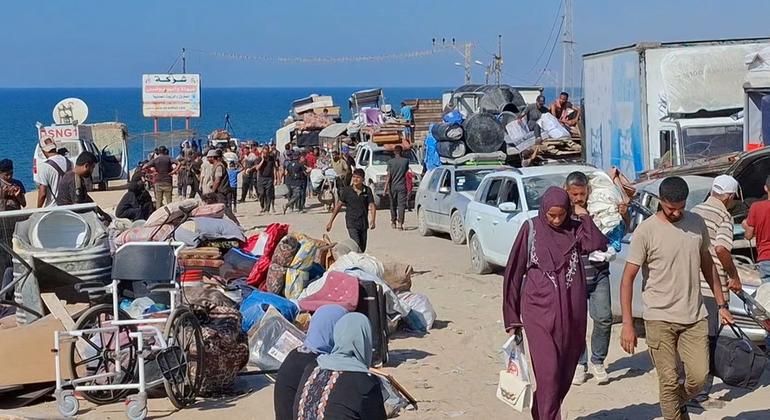Hundreds of Palestinian families are fleeing from northern Gaza to the south, facing a critical situation marked by the escalation of Israeli military operations. The coastal road al-Rashid has turned into chaos, with trucks and people moving amid bombings and constant attacks. The lack of transportation and exorbitant vehicle prices have forced many citizens to walk for hours carrying what little they have left.
Heartbreaking stories are emerging from the crowd. Abu Nader Siam, an elderly man, moves slowly, supporting his wife Zakia as he recounts the devastation they have suffered in their home in the Tel al-Hawa neighborhood. “We have walked for six hours because we could not find any cars or transportation,” he says. Zakia, visibly affected, adds that their house has been reduced to rubble, forcing them to move from place to place in search of temporary shelter.
The situation at the Wadi Gaza bridge is especially alarming. The massive influx of people, along with the number of broken-down vehicles, has created a true chaos, without the intervention of authorities to manage traffic. Many of the displaced express their desperation over the lack of tents and shelter spaces in the south, where they hope to find safety.
Umm Shadi al-Ashqar carries a bag with her belongings and describes the horrific situation in Gaza: “There is death, bombings, explosions, and destruction of homes.” Her account reflects the suffering of many, like Ayman al-Khatib, a young man who, leaning on his aunt, reveals that he has lost nearly all his family members. “More than 25 members of my family were killed,” he laments.
According to data from the UN Agency for Palestinian Refugees (UNRWA), the average cost of displacement in Gaza is alarming. The organization warns of the shortage of fuel and the lack of shelter supplies, which have been unable to enter for months due to the blockade imposed by Israel. In the last month, more than 250,000 people have been displaced, including 60,000 in just 72 hours, as Israeli troops advance into densely populated neighborhoods. The humanitarian situation is becoming increasingly desperate and requires urgent attention.
Source: MiMub in Spanish
